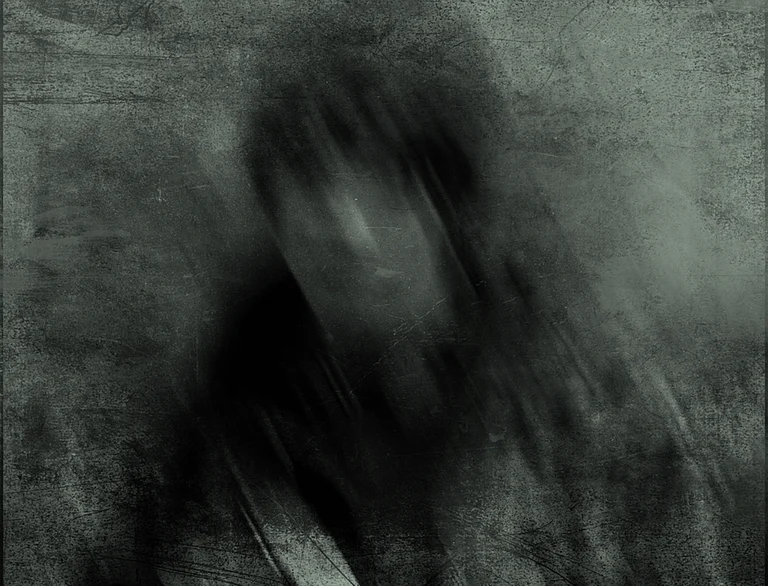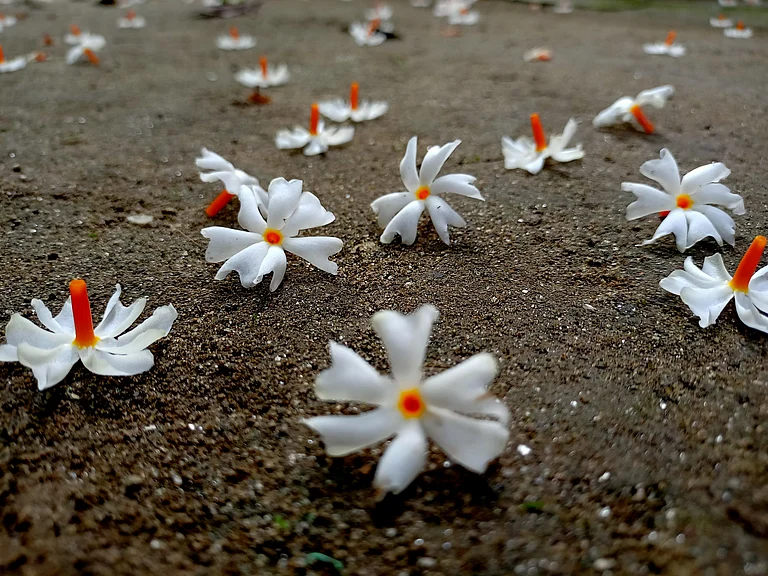“Maa. I made a mistake. Maa, I watched ‘Three of Us’.”
I marked it in my notes after completing the film. Wondering, tossing my notes, and reflecting enough, I detected the cause of writing these sentences. Days ago, I read ‘Backbone Flute: Selected Poetry of Vladimir Mayakovsky’, where I found this: “Hello! Who’s speaking? Mother? Mother! Your son has a wonderful sickness! Mother! His heart has been set alight!”
Placing these two collections of sentences side by side, a tie-in emerges. Mayakovsky set down a giant grief. And while watching this film, I felt and put down the vicarious experience of unprocessed grief.
In ‘Three of Us’, when we run into our protagonist, Shailaja (Shefali Shah), we see through her stresses and her scuffling to keep her memory intact while tracking her to-do list. We discover she even forgets the basic ingredients of food-making, like salt. Everyone fears her— her husband, her son, her neighbour, and her friends. Her broken memory causes a case of untetheredness — no one wants to connect to her anymore. Stigma prevails there.
Defying these dedicated difficulties, her mind is on the verge of quitting, but she animates her desire to sense, to wander, to live. Amidst this confusion and keeping her memory in check, she accepts retirement from her job. Her retirement, which results from her broken memory, proffers her an opening to visit the territory of the past — a space for retrospection.
She posits the idea of travelling to Vengurla, Konkan, to her husband, Dipankar Desai (Swanand Kirkire), where she has completed her middle school education. Footloose in the town, she swifts in the streets, as if someone is trying to find her. As if she is searching for something unsearchable. As if she would find it.
In those wandering moments, we trace her toil to find a person named Pradeep Kamat (Jaideep Ahlawat), who turns out to be her past lover. Considering we become conscious of her present and past through her encounters with people in the town, we also hunt for what her psyche has bestowed with and has grappled for its survival. We pursue that it’s not something that we call past love, which she thirsts for in this place; it’s quite more significant than this.
As the film unravels itself, we learn the nuanced features of her life and her psyche. Little by little, we comprehend that it’s her undead guilt and unprocessed grief that have turned themselves into a case of broken memory —dementia— just to find a sort of exit from her body.
Human physiology is not meant to hold over any emotions for quite a while without getting regulated or disclosed. Just like us, our emotions, whether processed or unprocessed, deserve freedom. But in the case of Shailaja, it seems she was never in possession of her time, space, and, most importantly, people to process her grief and deal with her guilt.
Grief is the first step towards mastering the turbulence of life. But for Shailaja, this first stair, this origin of twist in life, was plucked off. She becomes the victim of unprocessed grief. Her return to Konkan is nothing but an unrequited longing for her origin, her ‘udgam’, and her ‘mool utpatti’ to process the unprocessed. Her people are there—Pradeep and Old Woman—with whom she wants to process her grief. With whom we want to share the grief, it must be an option to choose. She didn't even have her own people to share her grief with. And later, her grief got its due when she became utterly vulnerable before these two people — Pradeep and Old Woman. It seems the title ‘Three of Us’ refers to them.
In Konkan, wherever she moves, she finds grief. This deluged meetup with grief might have helped her find some solace in the fact that she is not the only one. Pradeep told her about her father's disappearance into nowhere. When she encounters her English teacher, she, too, decries her husband's death, and then she narrates how she finds him in these photos that he clicked on. The old woman’s grief is that she lost Shailaja's companionship 28 years ago.
Indisputably, it must be considered that it’s not the death of any random person that aids us to comprehend life more, but rather the death of our loved ones that offers us an appreciation for the complexities and futility of life the most. That missingness is a way to live fully — it builds us up to accept the inevitable. The loss of them inculcates our behaviour towards life. In short, when we remember their deaths, we also remember our lives.
If we glance at Shailaja’s life, we might commiserate with and comprehend more about her unprocessed grief. Just after her sister’s death, which she thinks she caused (guilt), she was brought to Mumbai. Then study. Exam. Job. Marriage. Child. Child caring. Child’s schooling. And then dementia. The director never shows if she has ever amassed the time to process the unprocessed. And even in between, her parents died. Grief has piled up in her body and in her psyche.
Her therapeutic companion seems to be art only. Not the kind of art that she would perform and find joy in. But art, which she could enjoy watching, listening to, and reading instead of performing. In Mumbai, when she listened to one of her friends performing classical music on the phone, her eyes shimmered and her chubby cheeks blushed. When she read and listened to Pradeep’s writing in Konkan, she brimmed with delight.
But when she returned to the dance academy, where she used to learn classical dance in Konkan, we saw her struggling to perform there. She, with teary eyes and a pale face, witnessed those students dancing there, and then she joined. In a moment, something hits her; might she forget the step? But we see that this moment of dance might have imparted her with short-term catharsis.
Catharsis because when she flung her body in the air in a pattern, it released the pain — the unresolved pain. It seems like a step toward helping herself process the grief. But she glides from there too, fearing the familiarity of unprocessed grief will be lost. How tempted are we as humans to live in familiarity, even if it reports us with severe pain? She vanishes from there, behind the wall, far from the dancing girls.
In one of the scenes, Shailaja returns to her childhood gossiper, Old Woman, where she performs supreme vulnerability. She breaks down and tells her that “everyone told me that you must have” and, breaking the sentences in between, the woman utters, "died by now” and “you didn’t forget me; that’s why I live”. And while playing along this line on the ferris wheel, Shailaja told Pradeep, “I may not be able to remember you for long” and Pradeep retreated: “Don't worry. I will remember you.” It’s quite connected to what the old woman said to Shailaja.
Memory is at play here. If someone looks back on us through their memory, then we find that we are alive. It is as if we are living because we are in the memory lane of our loved ones. To live and to exist, we must be in our beloved’s memory. It also advocates something so dreadful about Shailaja’s memory that, in the coming days, there would be no one in her memory, not even her loved ones, not even her son.
Observing the film from a lover’s perspective, we encounter a scene where both of them —Shailaja and Pradeep— are in the frame on the ferris wheel. In a moment, it stopped in the sky. The sky, which is a space for solitude (paradise), has never been conquered by people; at least the sky they are sharing hasn’t been conquered till now —one can only sense emancipation there, and here is shot this scene— in the light-blue sky because the surface of the earth (read: people) can’t tolerate the heaviness and thickness in the ambience that get induced by the dialogue of two past lovers, who only got separated by sheer luck and aren’t destined to be with each other.
The sky they are sharing is an image of their past space, where they might have the same level of intimacy, where they don’t see others except themselves, and where they might be raptured by their own conversation. It seems a repetition of the past can only happen in the sky. A representation of — it'll never happen again. And if ever they meet, they’ll meet again, like in their childhood, when they’ll both be in the lap of intimacy, of solitude, and of pious paradise.





















